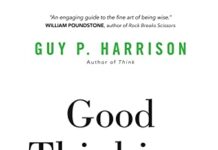
Ebook Info
- Published: 2017
- Number of pages: 380 pages
- Format: PDF
- File Size: 4.20 MB
- Authors: Guy P. Harrison
Description
At a time when the news cycle turns on a tweet, journalism gets confused with opinion, and facts are treated as negotiable information, applying critical thinking skills to your social media consumption is more important than ever.Guy P. Harrison, an upbeat advocate of scientific literacy and positive skepticism, demonstrates how critical thinking can enhance the benefits of social media while giving users the skills to guard against its dangers.Social media has more than two billion users and continues to grow. Its widespread appeal as a means of staying in touch with friends and keeping up with daily news masks some serious pitfalls– misinformation, pseudoscience, fraud, propaganda, and irrational beliefs, for example, presented in an attractive, easy-to-share form. This book will teach you how to resist the psychological and behavioral manipulation of social media and avoid the mistakes that millions have already made and now regret.Harrison presents scientific studies that show why your subconscious mind loves social media and how that can work against your ability to critically evaluate information. Among other things, social media reinforces your biases, clouds your judgment with images that leave a false impression, and fills your brain with anecdotes that become cheap substitutes for objective data. The very nature of the technology keeps you in a bubble; by tracking your preferences it sends only filtered newsfeeds, so that you rarely see anything that might challenge your set notions. Harrison explores the implications of having digital “friends” and the effects on mood, self-esteem, and the cultivation of friendship in the real world. He discusses how social media affects attention spans and the ability to consider issues in depth. And he suggests ways to protect yourself against privacy invasion, cyberstalking, biased misinformation, catfishing, trolls, misuse of photos, and the confusion over fake news versus credible journalism.
User’s Reviews
Editorial Reviews: Review “We all deserve to live in a social media environment that is responsive, responsible, and humane. So if you’re looking for helpful insights on how to evaluate the health of your own social media habits, how to maintain your privacy in a world of ubiquitous commercial surveillance, how to strengthen good thinking habits in an always-on context, and how to effectively contribute to creating the humane media system we all need, you must read this book.” —Lynn Schofield Clark, professor, University of Denver; author, The Parent App; and coauthor, Young People and the Future of News “[A] skillfully written and researched survey…. [This] book addresses timely topics, such as avoiding information ‘filter bubbles’ and ‘fake news.’ It also contains a well-designed chart for objectively measuring time devoted to social media and cogent advice about healthy use and warning signs. Perhaps the strongest sections are discussions of the importance of critical thinking, ‘standard weak points’ to be aware of in news reports, and five steps to ‘think like a scientist.’ Harrison manages to be firm without being a fearmonger.” —Publishers Weekly “Guy P. Harrison has become an essential guide to the human mind and a champion of science, reason, and critical thinking. In this new book, the celebrated author of Think and Good Thinking applies his signature wit, insight, and good nature as he tackles the Internet and social media, two omnipresent beasts that he shows us how to tame. From fake news to privacy and filter bubbles, Harrison leaves no stone unturned, and he delivers another brilliant and vitally important book.” —Julien Musolino, professor of psychology and cognitive science at Rutgers University, and author of The Soul Fallacy “Harrison looks at what social media is doing to us as individuals, to our culture, and to our lives. Sometimes the results are ugly: addictions float to the surface; we live in self-imposed bubbles of groupthink; and we have difficulty separating real from unreal. But the Internet also allows for love, creativity, and endless communication. Harrison wisely notes that this whiz-bang technology is going to be messy, because it’s at root a deeply communal human creation. Humans made it, humans are constantly remaking it, and the results are going to be chaotic—which might be a good thing. Instead of imagining a utopia just beyond the next Silicon Valley ‘disruption,’ we might be better off realizing that the Internet, like life, does not tend toward overarching ideals. Harrison keeps us planted on the ground even as he investigates the electrical ephemera surrounding, enriching, and sometimes destroying us.” —Eric Geissinger, author of Virtual Billions and the forthcoming Gamer Nation “Think Before You Like reveals social media as a ‘vast playground’ of shallow ties, rampant untruths, and endless trivia. But with Harrison’s help, we can create more tolerant, truth-abiding, and thoughtful lives—on- and off-line.” —Maggie Jackson, author of Distracted “Harrison combines outstanding and comprehensive research with engaging, colorful, and entertaining writing. His spot-on book raises and addresses important issues on how we are both victims and beneficiaries of a wired world. Readers should heed his call to pay attention to and think about social media’s role in society and in their lives. This is a fascinating treatment of an important subject.” —Larry Atkins, author of Skewed: A Critical Thinker’s Guide to Media Bias “Deeply researched and always engaging, Think Before You Like is a fascinating exploration of online social networks. If you are on social media, don’t hesitate; read this book now!” —Adam Alter, associate professor of marketing and psychology at New York University’s Stern School of Business, and author of Irresistible: The Rise of Addictive Technology and the Business of Keeping Us Hooked PRAISE FOR GOOD THINKING: “Harrison delivers a highly entertaining and extremely readable manifesto for using logic and reason for good thinking and a life better-lived.” –San Francisco Book Review “Harrison proves himself an excellent guide to reasonable thought in the ‘swirling, festering ball of deception and madness’ that is the modern world.” –Publishers Weekly PRAISE FOR THINK: “Terrific, useful, well-written, and just plain entertaining. …Think is a book that should be on every skeptic’s bookshelf, and, more importantly, the bookshelf of anyone who is not yet convinced that science is the best way to know.” –Skeptical Inquirer “Very useful…. Harrison demonstrates the need for critical analysis in a world of conflicting stories and glib ‘facts.”‘ –Publishers Weekly About the Author Guy P. Harrison is an award-winning journalist and the author of Good Thinking: What You Need to Know to Be Smarter, Safer, Wealthier, and Wiser; Think: Why You Should Question Everything; 50 Simple Questions for Every Christian; 50 Popular Beliefs That People Think Are True; 50 Reasons People Give for Believing in a God; and Race and Reality: What Everyone Should Know about Our Biological Diversity. Excerpt. © Reprinted by permission. All rights reserved. IntroductionSomething big is happening. Much of human culture is changing in a way that may come to redefine what it means to be a “normal” member of society, to be human. Evolution—change, transition, upheaval—is nothing new, of course. This moment, however, has a heavy feel to it, as if something profound is gaining momentum. This is so big that it may join the short list of all-time game changers: bipedalism, brain expansion, tool making, control of fire, language, music, sea travel, agriculture, pastoralism, civilization, mathematics, philosophy, industrialization, aviation, spaceflight, and social media. Wait, social media? You cannot be serious. Social media?How can anyone think of Facebook, Snapchat, Instagram, Twitter, and so on as catalysts for some looming deep and revolutionary shift for all of humankind? Aren’t these nothing more than glorified time-sucks that enable us to share inane videos, brag about the minor triumphs of our common lives, call strangers mean names, and gobble up fake news? Aren’t these social media platforms just a way for companies to track us, spy on us, and sell off the crumb trails of our private lives to the highest bidder? How can social media possibly matter?Look a little deeper and it becomes clear that the explosive popularity of social media is an important global phenomenon, a force that may be restructuring humanity. For all the banality and ethical concerns, Facebook and other platforms seem to be fulfilling the great promise of the Internet: to connect and tie our species together like never before. Soon there will be many tens of billions of devices connected to the Internet. We are in the process of wiring the world and ourselves rapidly and completely. Think Before You Like addresses some of the challenges and dangers that come with online connection, networking, and interaction. Some concerns are external, such as the way social media companies collect and profit off users’ “private” data. They also manipulate people’s minds, hook them in ways not so different from how casinos manage to keep gambling addicts planted in front of slot machines for hours. Other concerns are internal. Most social media users are not aware of the natural and standard human cognitive biases, mental shortcuts, perception problems, and emotional weak spots that can and do trip them up online. This book can help with that.Acknowledging serious problems does not mean we must fear, hate, or reject social media. A bit of awareness and personal dedication to good thinking can be enough to significantly elevate and make safer the social media experience. It should not surprise us that billions have been drawn to one form of social media or another. We are primates, social creatures who find it not only enjoyable but also necessary to form social bonds and maintain near-constant communication with others. The worst fate for a prisoner, for example, is not the threat of violence, regret, boredom, bad food, or even torture. It’s isolation. Prison administrators use solitary confinement as the ultimate punishment for prisoners who refuse to follow rules. Separate a human from humanity, and you move to kill something important within him or her. People need people; and social media feeds the hunger, to some degree. These various platforms help us do what we must: communicate, share feelings, gossip, teach, learn, brag, envy, hate, and love.If the trends hold, its seems that everyone eventually will be connected within multiple, overlapping digital networks. Facebook, still so young, now has more than two billion users. WhatsApp and YouTube claim a billion each. QQ and WeChat are both moving toward a billion users. Do you know about Baidu Tieba? If not, you might one day soon because more than 600 million of your fellow humans are already on it. Even with user overlap, we can see that social media is big and getting bigger. But let’s not get carried away.Social media sites are great for keeping in touch with old friends and finding new ones. Everybody loves it when Facebook helps people raise funds for a beloved teacher’s cancer treatment. But, as with any other far-reaching human endeavor, this one comes with a few negatives. Terrorists love social media, too, and some use it to their advantage, as do criminals, bullies, and imbeciles who spread nonsense. Social media platforms are tools that can be used to build or to destroy.This book is neither an endorsement nor a condemnation of social media. I have no idea if the good will outweigh the bad in the long term. And, when realistic virtual reality and augmented reality arrive in force, social media is sure to morph and evolve rapidly. All that can be said with certainty today is that there is an urgent need for all users to arm themselves with knowledge about how social media companies operate, how our brains function online, and what steps we can take to protect ourselves.This is not a book aimed at dumb or gullible people. This book is for smart, reasonable people, just like you. The social media arena is a place where millions of human minds are manipulated and steered for someone else’s gain. High intelligence or traditional educational accomplishments won’t be enough to protect you. There is no place for arrogance here. Those who believe they could never fall for a silly belief already have. Those who think they are above being exploited online and made vulnerable make the easiest marks. Awareness about the realities of various social media ecosystems can be off-putting. But don’t be afraid. Be prepared. Don’t turn off social media, necessarily; but use it wisely.Guy P. Harrison California, 2017 Read more
Reviews from Amazon users which were colected at the time this book was published on the website:
⭐Much needed guidance in our current times. Love that this book made me question my own tendencies to go along with or almost automatically “believe” things I emotionally respond to as validation or comforting.. without thoroughly considering the source, or credibility of the source, beforehand. I THINK I’m a little bit better both in Social Media and general. Thanks Guy for pulling together and organizing educated and researched perspectives. I’ve bought several as gifts.
⭐Most of the content can be summed up by using common sense and reasonable self discipline while online. Too wordy.
⭐Alot of these points are really well known and this could be made in 10 pages and I would still get the same messageAlso why does this article mention the world being flat
⭐Not much meat in the book – rehasing old thoughts
⭐This book focuses on social media, but it’s really a guide to and advocacy for critical thinking. As Harrison himself says, the term “critical thinking” would likely scare people away. Social media have made critical thinking more important than ever, while at the same time our population is poorly uneducated and unprepared to assess the vast amount of news and fake news that’s available. Harrison’s points about social media aren’t particularly new or exciting, but he provides valuable insight into the way we receive and distort information. For example, on p 145 (which may not be the same page in the final version) he says: “…any randomly selected 21st century person is likely to know more about astrology than astronomy, more myth than history, and be far more concerned with unproven supernatural forces that allegedly run his or her life than the revealed natural forces that run the universe…a result of people simply failing to think before they believe.”You don’t have to look to politics to see failures of critical thinking. For instance, there’s really no such thing as preventive medicine — just risk reduction and early detection, which may lower the likelihood of dying or serious illness, usually by a small percentage. In particular, many people have questioned the value of CPR (which may save lives but often the lives saved have very low quality) and the value of cardiograms on healthy, asymptomatic adults (false positives as high as 80%). If you’ve ever tried to quote research like this to a scientifically educated physician — who probably scoffs at climate deniers — you’ll probably get a nonscientific response based on groupthink. I’ve sent people copies of Dr. Gilbert Welch’s books, which question the value of screening tests; it’s just like presenting evolution to a bunch of creationists. Medicine, education and the criminal justice system are not informed by critical thinking, at least in the US and many countries all over the world.Harrison provides lots of psychological research to support his discussions of cognitive bias. What’s missing are examples that would make these concepts more accessible. For example, I would have liked to see a few stories about inoculation theory in real life as well as summaries of studies.The critical thinking fallacies deserve wider understanding. However, I suspect we’re seeing a case of preaching to the choir here. People who are most resistant to these concepts won’t be reading this book.Some chapters were more closely related to the topic of social media, such as privacy and addiction. These chapters present commonsense, realistic, psychology-based responses to these controversial areas.It’s 4 stars because the presentation can seem a little dry, with lots of long quotes filled with abstract terms and concepts. Some of these may be chopped by the time the final book appears. However, I’d rather see a book that errs on the side of research — risking dryness — than one of the many fluffy “business books” that are published, it seems, every week.
⭐This book is an intense criticism of social media. Because: Social media reduces the number and intensity of face-to-face relationships. It consumes considerable time that could be spent more productively, even more enjoyably. The filters used by some companies do their best to reinforce what each user wants to hear, even if it’s factually incorrect or planted political fake news. Social media influences what you think more than you think. It pressures you to agree with others instead of thinking for yourself. It encourages you to frequently post inane information, and also to reveal important private information when that is against your interests (or another person’s). Social media companies do not protect your privacy; instead they harvest as much data about you as possible for their own financial benefit.And everyone falls for all this because primates are hard-wired to be social.I expected this to be one of those fluffy self-help books with big print, lost of white space, short bulleted lists, and quotes from random, unknown social media users. It does have some of the quotes, but overall it’s much denser than I expected (though parts appear to be hastily written). I don’t like fluffy self-help books, but I’m not sure this book says anything more than if it were one. There’s absolutely nothing new in here.I don’t believe that all humans are equally group oriented, or equally inclined to conform. I don’t believe they all have equivalent educations. I don’t believe they are all lacking in the ability to think critically. I don’t believe they all spend the same amount of time on social media. The repeated assertion that we do things because we are primates doesn’t really explain anything.I absolutely agree with the author’s criticisms of social media. However, that is precisely because I am an analytical thinker and not group oriented. I can’t see the audience this book addresses (unthinking social media addicts) ever bothering to read it.
Keywords
Free Download Think Before You Like: Social Media’s Effect on the Brain and the Tools You Need to Navigate Your Newsfeed in PDF format
Think Before You Like: Social Media’s Effect on the Brain and the Tools You Need to Navigate Your Newsfeed PDF Free Download
Download Think Before You Like: Social Media’s Effect on the Brain and the Tools You Need to Navigate Your Newsfeed 2017 PDF Free
Think Before You Like: Social Media’s Effect on the Brain and the Tools You Need to Navigate Your Newsfeed 2017 PDF Free Download
Download Think Before You Like: Social Media’s Effect on the Brain and the Tools You Need to Navigate Your Newsfeed PDF
Free Download Ebook Think Before You Like: Social Media’s Effect on the Brain and the Tools You Need to Navigate Your Newsfeed



